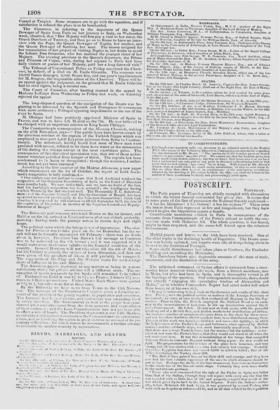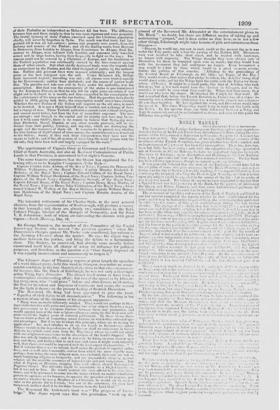The subjoined retrospect of Syrian affairs is extracted from a
trust- worthy letter received within the week, from a British merchamt, now in 3Ialta, but sell() had been in Syria, and is thoroughly versed in all the bearings of' the question. Oar correspondent mentions, that u doubt was alreedy " engaging the speculative wisdom of Alexandria and 31alta," es to whether l;oniniodore Napier had acted under full orders from Ilona., or at his own ri " It may l.mm interesting to le,di hack on the character and results of this short war. Pas,i1.1; Over the politieal motive or motives of the Foreign Secretary as imerutalile, me conic at time to the fleet anchored elf Beyrout on the 9th Sep- tend. r. Prior to this, the liciti,li employed Mr. Richard Wood as nit emis- sary to the mountaineers of Lehanon, to stir up insurrection against the rie forf,, C,overittneitt. Ile fIdled. Ile was now at work again, with the powerful • noxil:•iry aid of a British fleet, alai British muskets thr distribution uit libitum. An inuacti..e number of moon taitteers cattle down to the shore for t hese arms; anti not list than :10,000 to .1tht a to muskets have been distributed among them. 'thin mst of the hork Ives fight Mg—brilliant and successful lighting; in which tint lielp`cytteat of the Pasha's troops and tortresAus, when tippo:mi by British mai ine: mimilite••of-hatt le ship,, W:14 OHBA lamentably manifested. It is true ilmni there on, a large I urk .11 force, hut the marines .1 td the lighting : so ter- iitm'ii last ff ere the Pasha's forces, that they would lnit stand at all when the led mat., us 'rim seen. It With this IVIDIITUIIZRII011 oh Ilia ITOOpS that compelled ID CVIICunte lie.■ rout without firing a gun Imi,t mem would not .1;01, Ills preparations 14 the ml. mum of the place were immense, nod very •••■ tong, but all was IISI:ICFS miii II IP, :I W110 lia,i entirely lost courage. Probably the retire Egyptian loss does not exceed 3,000 to 4,000 in killed ; that of the Allies (excluding the 'larks) ml,mmmt 200. " have gained 1,1mm r for their skill and courage, and they have new had the first valuable expel ienre of the tows to which ate: Ts 811(1111(1 be mitt 111 war. l'crlinps the shells of ilium four steamers at Arm, were as destructive as tint whole live of the line-of-battle whips. Certainly they were mot•e deadly to the iselliirtnnate garrison. " Those who were convinced that the role of the Pasha in Syria was better than that of the Sultan, (t hough they will rejoice with every one else that the war is coded with he) iittie loss of I m It, and property,) regret that result of the Mar Which, gives Syria 111111% tim ti im I ;rand Seignor. Under the Soltati's umumthiO rity, before Alibi:met All took riii, it was governed ity HP vend Pushes, who were each mis (k1111)IIC as rulers voald be, and la all that related to the regulation of their Pashalies as independent as Mehemet All has been. The difference between him and them simply is, that he was more vigorous and more powerful. The brutal tyranny of these Paellas, exercised upon the Christian population chiefly, will never be forgotten in Syria. The result was that trade had lan- guished till it was all hut extinct ; person and property were unsafr, from the jealousy and avarice of the Pathos ; and all the leading roads, from Beyrout to Damascus, from Latakia to Aleppo, from Seanderoon to Aleppo, from Da. mantis to Aleppti, were infested with banditti, and caravans only travelled armed and in large bodies, having then frequeatly to fight on the ways. Da- mascus could not be entered by a Christian of Europe, and the fanaticism of the Turkish population was continually excited by the Government against those of other creeds. But what chiefly destroyed trade were the imposts laid on everywhere by the Pashas, and the total disregard of justice by the authori- ties. Sudden and grievous fines were imposed arbitrarily ; and the longest purse or the best intriguer won the suit. tinder Mehemet Ali, British trade increased tenfidd; travelling was safe ; all classes were treated equally by the Government ; sudden fines abolished ; aud the course of justice made free. The peculiar and sole new evil to Syria under his authority, was the -conscription. But that was the consequence of the status in quo maintained by the European Powers, so that he was left far eight years untertain if war might not he declared in a month, and thus compelled to the conscription thr the maintenance of his army on the war footing. Had the question hi:ea./in/thy settled in 1832, giving him Syria, the conscription would never have existed. Whether the new Pashas of the Sultan will improve on the old ones, is much to lie doubted. It is not a Hatti Scheriff that is wanted, not a change of laws, but a change of men. These Turkish authorities cannot exist w lt twat intrigues, and cannot resist brilies, but from the fear of immediate exposure. The men are corrupt ; and though in the capital and its vicinity new laws may be eii. fore d with some fidelity, there is no reason to believe that Syria, any more than Diarbekir, Mosul, Bagdad, or any other remote province, will lie de- livered from that perfidy ty.ranny and rapacity which are destroying the siltr% EXCHANOK, FRID APTERNOON.
, , •
people and the resources of them all. It retnains to be proved, too, whether the distribution of 40,000 stand of onus among the mountaineers was beneficial to the Sultan. barely if they seek their independence, they have now the means to hold it ; and if the obi system of mole-ting the roads return with the old rule, they have been well aud largely equipped fur the work."



























 Previous page
Previous page